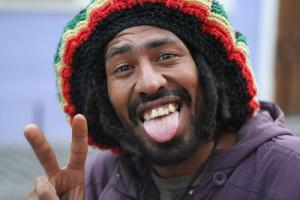A court in Ontario has struck down Canada's marijuana law, saying it prevented patients from gaining access to their medicine. Now, the government has 90 days to respond before pot is legal in Ontario.
A new poll in California shows strong support for reducing drug possession from a felony to a misdemeanor and lesser, but still substantial, support for decriminalization.
Montana's Republican legislature wanted to repeal the state's voter-approved medical marijuana law, but the Democratic governor struck it down with the veto pen.
This is the final installment in a six-part series highlighting interesting and important pages from ProCon.org, an in-depth web site presenting information and views from a variety of perspectives on controversial issues, several of which relate to drug policy.
Just when you thought it couldn't possibly get worse... 116 bodies turn up in a series of mass graves just south of the border.
A decade ago, the Jamaican government quietly shelved a National Ganja Commission report calling for decriminalization. This week, it decided to take it up again.
Poland is taking steps to reform its harsh drug laws with something that looks a little bit like the decriminalization of drug possession. It's a start.
A typical corrupt cop week: Missing evidence, corruption on the border, greedy jail guards, and thuggish dope squad cops.
A bill that would authorize medical marijuana dispensaries and increase patient protections in Washington state has passed both houses, but faces a reconciliation vote in the Senate and a less-than-committed governor.
Maryland looks set to approve a medical marijuana affirmative defense bill, with only one more pro forma Senate vote left before it goes to the governor for his signature.
Simple drug possession is about to become a misdemeanor in Delaware, as a major drug sentencing reform bill awaits one last procedural vote.
Acting with great rapidity for a legislative body, the Czech Parliament has moved to ban dozens of synthetic drugs, and the stuff that gets you high in salvia divinorum, too.
Events and quotes of note from this week's drug policy events of years past.
An Ontario Superior Court judge Tuesday threw out the sections of Canada's Controlled Drugs and Substances Act that bar marijuana possession and cultivation. The ruling came in the case of R. v. Mernagh, in which a medical marijuana patient argued that Health Canada's Marihuana Medical Access Regulations (MMAR) were so burdensome that the effectively barred patients from gaining legal access to marijuana.

Ontario marijuana grow (RCMP)
Matt Mernagh is a medical marijuana patient and activist who used the herb to relieve the symptoms of scoliosis, seizures, and fibryomyalgia. Mernagh was unable to find a doctor willing to sign the paperwork to allow him to become a legal patient under the MMAR, and was raided and arrested for growing his own plants without a license.
In the ruling, Justice Donald Taliano gave the government 90 days to come up with a solution in line with the Canadian Charter of Rights and Freedoms. The government could appeal the decision. If the government does not act within 90 days, marijuana will be legal across the province of Ontario, and the Ontario precedent could be considered by courts in other provinces.
The MMAR and the sections of the Controlled Drugs and Substances Act that prohibit marijuana possession and cultivation are "constitutionally invalid and of no force and effect," Taliano found.
There is some irony in the decision. A decade ago, in
R. v. Parker, the Ontario Court of Appeals struck down Canada's marijuana laws because they failed to provide access for medical marijuana patients. The MMAR was ultimately the Canadian government's response, but now the Ontario court has held it to be to be part of the problem.
"The road to marihuana approval is a virtual obstacle course which few patients can navigate," Taliano wrote in the opinion. "Rather than providing access to medicinal marihuana, the MMAR raise so many barriers to access that the defense is meaningless and illusory for most patients... Seriously ill persons who need marihuana to treat their symptoms are forced to choose between their health and their liberty. If they choose their health, they must go to significant lengths to obtain the marihuana they need, including lengthy trips to purchase the drug, resort to the black market, and living with the constant stress that at any time they could be subject to criminal prosecution. These already sick individuals must further cope with the added stress of the stigma and social rejection of friends, family and members of the public who see them as criminals. This is not to mention the real fear of losing one's doctor simply by inquiring about the drug and damage to the patient-doctor relationship."
Judge Taliano also found that Canadian physicians' reluctance to okay medical marijuana use made the MMAR, under which patients require a doctor's approval, unworkable. Their "overwhelming refusal to participate in the medicinal marijuana program completely undermines the effectiveness of the program," Taliano noted. "The requirement for a medical doctor's declaration has rendered the MMAR unconstitutional," he concluded.
"Complaints about the doctor-as-gatekeeper role, from patients and physicians, have been a constant feature of this flawed system," said Kirk Tousaw, a British Columbia attorney and head of the pro-legalization
Beyond Prohibition Foundation. "This decision represents a huge step forward for critically and chronically ill Canadians that want to access this safe and effective medicine without being turned into criminals for doing so."
"I know how hard it has been to find a supportive physician," said Jacob Hunter, policy director for the foundation and a medical marijuana patient. "There are a million medical cannabis consumers in Canada and, in ten years, less than 10,000 have been able to become legal. That just isn't right."
The Ontario ruling also excited other legalizing lawyers. "It's significant because it's a Superior Court ruling which has binding effect across the province," marijuana lawyer and legalization advocate Alan Young told the
Toronto Star. "By enacting a dysfunctional medical program the government now has to pay the high cost of losing the constitutional authority to criminalize marijuana."
The real test, Young said, will be what the Ontario Court of Appeal decides, assuming that the government does appeal the decision. "If the government is not successful on appeal, they are going to be caught between a rock and a hard place because they don't have an alternative program in mind," he said. "They don't have a plan B. They're in trouble."

marijuana eradication helicopter, Ontario (RCMP)
Plaintiff Mernagh was pleased as punch, he told
Cannabis Culture magazine in a Tuesday night interview. "It definitely hasn't sunk in yet," Mernagh said. "I got everything I believed I could get. We put a lot into this case. [Lawyer] Paul Lewin and I worked literally from Labor Day till the day we went into court. I'm still really overwhelmed when I think about it. It's groundbreaking."
Now, the Canadian federal government has 90 days to either file an appeal, which is almost certain, or to come up with a workable legislative model that allows patients access to marijuana in line with the Charter of Rights and Freedoms. Or not.
"Who knows?" speculated Tousaw, "The government could always choose not to re-legislate, as it did with the abortions laws after the Morgentaler decision [striking down Canada's abortion laws], and finally put an end to the harms being caused by marijuana prohibition."
Who knows, indeed? Prime Minister Stephen Harper and his Conservative government are avowed foes of marijuana law reform. But Canadian voters go to the polls May 2 to elect a new national government, and by the time election day is over, Canada could once again be led by the Liberals. They failed to even decriminalize marijuana the last time they were in power, but perhaps they would be willing to think again in 2011.
back to top
California voters strongly approve of reducing penalties for simple drug possession, according to a poll released Monday by number of groups seeking drug law reforms. Nearly three-quarters (72%) surveyed favored reducing the penalties for drug possession, including strong majorities of Democrats (79%), independents (72%), and Republicans (66%).

Californians appear ready to reduce drug possession to misdemeanor. (Image courtesy Aaron Logan via Wikimedia.org)
The poll was conducted by Lake Research and can be viewed
here. There is also an
accompanying press release. It was commissioned by the
Drug Policy Alliance, the
ACLU of Northern California and the
Ella Baker Center for Human Rights. It surveyed 800 likely voters in the 2012 general election between March 21 and March 24. The margin of error is +/- 3.5%.
Possession of drugs like cocaine and heroin is a felony in California and is punishable by up to three years in state prison. The state's overcrowded prison system currently holds 9,000 drug possession offenders at a cost of $4.5 million dollars a year. The state faces a budget deficit of more than $20 billion.
The polling results will help lay the groundwork for an effort to move legislation that would drop drug possession from a misdemeanor to a felony, advocates said during a Monday teleconference.
Not only did respondents want to see penalties for drug possession lowered, a majority wanted to see them dramatically lowered, if not removed altogether. Some 51% said either that drug possession sentences should not exceed three months (27%) or that drug possession should not be punished with jail time at all (24%).
A majority (56%) said California sends too many people to prison, and three-quarters said the state should instead use the millions spent to imprison drug users for schools, law enforcement, and health care.
Support for drastically reducing sentences for drug possession cut across all demographic, regional, and ethnic lines. And that support would translate into votes during an election, the poll found. More than 40% said they would be more likely to support a candidate who reduced the penalty to a misdemeanor, while only 15% said they would be less likely.
"We found a widely, and intensely, held belief among voters that California imprisons too many people and can no longer afford to spend billions on prisons amid massive cuts to education and social services," said Daniel Gotoff of Lake Research. "This is a voting issue now. Politicians stand in the way of this popular reform at their own risk."
Support for cutting drug possession sentences held up even after respondents were treated to opposing messages, Gotoff said. "It holds up under attack, and voters don't need to be argued into this," he said. "There is a strongly held perception that the state imprisons too many people and that current penalties are too harsh. The voters are pretty solid on this."
"Support for reducing drug possession penalties crosses all the partisan, regional, and demographic lines that normally divide California voters," said Allen Hopper, police practices director with the ACLU of Northern California. "Solid majorities of Republicans, Democrats and independents from every corner of the state overwhelmingly agree that it’s time for a new approach. We need to stop wasting precious tax dollars on unnecessary, expensive jail and prison sentences."
Last week, Gov. Jerry Brown (D) signed a bill that would "realign" the state's overburdened corrections system by diverting nonviolent offenders from the state prison system to county jails. But that measure has yet to be funded, and it does not reduce sentences, but instead merely shuffles inmates from the state to county lock-ups.
"Sacramento's plan to keep people convicted of personal drug possession at the county level doesn't address the belief of a majority of Californians that drug possession shouldn't be a felony and that people shouldn't be locked up for longer than three months for this offense," said Margaret Dooley-Sammuli, deputy state director in Southern California for the Drug Policy Alliance.
"Californians aren't just interested in saving money. They're also interested in seeing people contribute to their families and communities," said Kris Lev-Twombly, director of programs at the Ella Baker Center for Human Rights. "California voters want to see that people are not burdened with a life-long felony record for drug possession that makes it tough to find a job or support a family. Current penalties work against individual, family and community well-being and public safety."
Also addressing the teleconference was Maria Alexander of the Center for Living and Learning, a reentry services provider. "Many people we serve have successfully overcome drug problems, but now they can't find jobs because they have felony convictions," she said. "The fact that some people can overcome this barrier is a testament to their dedication and hard work, but we don't have to make it so hard. Giving these people felony records is counterproductive and anti-recovery."
"Californians clearly and strongly reject the state's misplaced priorities that have pushed funding toward jails and prisons and away from schools," said Alice Huffman, president of the California State Conference of the NAACP. "The California NAACP urges the state legislature and the governor to listen to voters and reduce the penalty for drug possession for personal use from a felony to a misdemeanor."
This poll suggests strong public support for de-felonizing drug possession in California and lesser, but still substantial support for decriminalizing it. Now, it's time to lean on the legislature to bring it into line with enlightened public sentiment.
back to top
Montana Gov. Brian Schweitzer Wednesday vetoed a bill that would have repealed the state's voter-approved medical marijuana law. A bill that would tightly regulate the state's medical marijuana industry and dramatically reduce the number of eligible patients remains alive.

Gov. Schweitzer heeds the will of the voters, not the legislature.
Riding a public backlash against perceived excesses by some players in the state's medical marijuana industry, both houses of the state legislature voted to approve a repeal bill,
House Bill 161, sponsored by House Speaker Mike Milburn (R-Cascade) that would completely undo the 2004 ballot initiative that legalized medical marijuana in the state.
"I issue this veto of HB 161 because I do not believe it is right that 91 legislators overturn the will of the people of Montana, who passed this citizen initiative in 2004 by a significant margin," Schweitzer said in a
veto statement.
Schweitzer added that he recognized that the state's medical marijuana act had evolved in ways not necessarily foreseen by voters, but insisted reform -- not repeal -- as the answer. "I believe the proper resolution of this unanticipated outcome is not outright repeal, but amendment to serve the original intent -- to provide a medicinal option for Montanans 'to alleviate the symptoms or effects of the patients' debilitating medical condition.'"
The remaining regulation bill,
Senate Bill 423, a last-minute replacement of an earlier regulation bill, has been repeatedly amended and rewritten, and the House and Senate have passed two completely different versions. A conference committee from both chambers will meet to try to find common ground. They have eight days before the session ends.
According to the Marijuana Policy Project, the Senate version of the bill was "imperfect," but the version passed by the House is harsh and "virtually unworkable." The group is urging its members to tell legislators to reject the House amendments.
back to top
The history drugs in sports goes back at least to the ancient Greeks and Romans, whose athletes made use of wine, hallucinogens, stimulants and other substances in attempts to enhance their performance. To learn more, visit History of Performance Enhancing Drugs in Sports, on the web site sportsanddrugs.procon.org, part of the ProCon.org family.
This is the final installment in a six-week Drug War Chronicle series highlighting interesting and important pages from ProCon.org. Click here to read last week's ProCon.org blurb, or sign up for ProCon.org's email list or RSS feed.
ProCon.org is a web site promoting critical thinking, education, and informed citizenship by presenting controversial issues in a straightforward, nonpartisan primarily pro-con format.

back to top
by Bernd Debusmann, Jr.
Mexican drug trafficking organizations make billions each year smuggling drugs into the United States, profiting enormously from the prohibitionist drug policies of the US government. Since Mexican president Felipe Calderon took office in December 2006 and called the armed forces into the fight against the so-called cartels, prohibition-related violence has killed more than 36,000 people, including more than 15,000 last year. The increasing militarization of the drug war and the arrest or killing of dozens of high-profile drug traffickers have failed to stem the flow of drugs -- or the violence -- whatsoever. The Merida initiative, which provides $1.4 billion over three years for the US to assist the Mexican government with training, equipment and intelligence, has so far failed to make a difference. Here are a few of the latest developments in Mexico's drug war:

Drug prohibition funds the mayhem in Mexico. (Image via Wikimedia.org)
In San Fernando, Tamaulipas,
authorities began discovering the first of what would eventually total at least 116 bodies in a complex of mass graves. At least some of the bodies are thought to be young men who were forcibly removed from passenger buses in the area some days prior. Authorities have suggested that the kidnappings may have been an attempt by the Zetas to recruit employees at gunpoint. A total of 17 suspects have so far been detained in connection with the bodies.
In August, 72 mostly Central American immigrants were murdered in the same area.
Across Mexico,
thousands took to the streets to protest the escalating drug-related violence. By some estimates, some 10,000 people participated in the marches, which were called for by Mexican poet and journalist Javier Sicilia, whose 24-year old son was tortured and murdered along with five other men the week before in Morelos.
Thursday, April 7
In Tepic, Nayarit,
two men were discovered who authorities say had been skinned alive and had their hearts removed. The two, who remain unidentified, were left outside a local shop. The motive for the killing -- brutal even by the standards of Mexico’s drug war -- is unclear.
On Wednesday, six gunmen were killed in Tepic during a shootout between two armed groups which occurred in broad daylight.
Friday, April 8
In Tijuana,
investigators announced that they have found more human bones and teeth on the property of a man who confessed to dissolving some 300 bodies for a drug cartel. Miguel Angel Guerrero, also known as the "stew maker" was arrested in January 2009. He told investigators that he was paid $600 a week to dissolve cartel victims in vats of caustic acid.
In Taxco, four
gunmen and a police officer were killed during a fire fight which took place after the attempted kidnapping of municipal Public Security Director Angel Garcia Rodriguez. Rodriguez was unharmed in the gun battle, which took place after security forces received reports of armed men outside his home.
Saturday, April 9
In Ciudad Juarez,
13 people were murdered in incidents across the city. In one incident, four men were killed and two were wounded when heavily armed gunmen attacked an auto mechanic’s shop. In another incident, a police officer assigned to a special unit was gunned down outside his home in the Revolucion Mexicana neighborhood of the city.
Monday, April 11
In Ciudad Juarez,
six people were murdered. According to statistics kept by researcher Molly Molloy, this brings the number of murdered individuals in Juarez to 707 so far for the year. Three of Monday's victims were females, including one who was found with her hands and feet bound and her face covered in duct tape.
Tuesday, April 12
In Michoacan,
the last of 35 officials and local politicians previously accused of aiding La Familia was acquitted by a Mexican judge. They had all been arrested in 2009.
Total Body Count for the Week: 127
Total Body Count for the Year: 1,991
Total Body Count for 2010: 15,273
Total Body Count for 2009: (approx.) 9,600
Total Body Count for 2008 (approx.): 5,400
Total Body Count for 2007 (approx): 4,300
Total Body Count for Calderon's drug war through 2010: 34,849
Total Body Count for Calderon’s drug war to date: 36,840
back to top
Ten years ago, Jamaica's government-appointed National Commission on Ganja produced a report calling for marijuana decriminalization, which the Jamaican government, under pressure from the US, promptly forgot about. But now, the government of Prime Minister Bruce Golding has announced that it will again review those recommendations.

The Jamaican government just might give this Rastaman something else to smile about. (Image via Wikimedia)
According to the
Associated Press, the decision was announced Monday in Kingston. Six cabinet ministers will review the 2001 report.
That report, which was authored by academics and physicians, found that pot smoking was "culturally entrenched" in the island nation and that most moderate users suffered no ill effects. While it called for decriminalization,
ominous rumblings from the US Embassy in Kingston at the time ensured that the notion died a quiet death.
Ganja has broad -- although not complete -- public acceptance in Jamaica, where it is considered a sacrament by adherents of Rastafarianism. But its possession or cultivation is illegal under Jamaican law.
The Rev. Webster Edwards, who was a commission member, told the Associated Press Tuesday he was relieved that the report would be reviewed by cabinet members and that he hoped the review would eventually lead to loosening the marijuana laws. That would require legislative action.
"There have been many persons who have been lifelong smokers of ganja who have not moved to harder drugs at all," Edwards said. "Decriminalizing very, very small quantities will allow persons not to get strikes against them in the justice system."
The US has long worked with Jamaican authorities to eradicate marijuana cultivation and smuggling from Jamaica to the US. Embassy officials told the AP Tuesday that they did not know why the Jamaican government was taking up the issue, but that it was an internal affair.
"Whatever the impetus, it's an internal Jamaican issue, and we therefore don't comment on either the debate or the outcome," Embassy spokeswoman Yolonda Kerney said.
Has enough changed in the past decade for the Jamaican government to actually move forward on the ganja commission recommendations this time? Has enough changed for Washington to not interfere? Let's hope so.
back to top
In the Polish Sejm (parliament) April 1 members voted to amend their draconian, decade-old drug laws. The move is designed to draw a distinction between users and dealers, and could result in no charges being filed against users, but slightly stiffer penalties for dealers and people holding large quantities of dope.

Warsaw skyline (image via wikimedia.org)
Under the current law, people possessing even the smallest amounts of illegal drugs can be sentenced to up to three years in prison. The amendment would enable prosecutors to avoid bringing charges against people holding small amounts of drugs who have not been previously convicted of a drug crime. Prosecutors would also make a determination on whether a person is drug dependent, and could order treatment in lieu of prosecution and imprisonment.
The measure passed the lower house on a vote of 258 to 159, with six abstentions. It must still be approved by the upper house and signed into law by the president.
Progress on reforming Poland's drug laws came only after years of delay. A team of experts appointed by the former justice minister had drawn up the amendments more than two years ago.
The Sejm was also the object of a concerted civil society campaign to liberalize the drug laws. Celebrity chef Robert Maklowicz created a Facebook video,
Cook Our Children a Better Future, arguing for reform, while at the same time,
71 Polish artists sent an open letter to the Sejm seeking a review of Polish drug policy.
Former Polish president Aleksander Kwa?niewski, sociologist Zygmunt Bauman, and renowned international human rights expert Wiktor Osiaty?ski also joined the fray, signing a
January open letter coordinated by Krytyka Polityczna, an influential group of liberal thinkers. Over 100 organizations from Poland and worldwide recently signed
a petition coordinated by the Polish Drug Policy Network.
For many advocates, the proposed reforms don't go far enough. There is also concern that the quantity guidelines for determining what constitutes personal use have yet to be set. But there are also rumblings of discontent from the other side of the issue. "Which mafia did you support today?" asked conservative Law and Justice Party member Beata Kampa.
[Editor's Note: Kampa's comment presumably was made without irony, but is actually highly ironic. While decriminalization without a legal supply won't undo the mafias, it is prohibition of drugs that allows mafias to earn illicit drug profits.]
back to top
A typical corrupt cops week: Missing evidence, corruption on the border, greedy jail guards, and thuggish dope squad cops. Let's get to it:

The profits of prohibition tempt law enforcement. (Image via Wikimedia.org)
In Asheville, North Carolina,
drugs, guns, and cash are missing from the Asheville Police Department evidence room. Auditors began investigating after the long-time evidence room manger resigned, and so far, they say they cannot account for 30 packets of cash, 27 guns, and 54 containers of drugs. Last month, they discovered that 400 oxycodone tablets were gone, too. The investigation continues, but the missing evidence could derail a number of criminal cases.
In Yuma, Arizona,
a US Border Patrol agent was arrested April 5 after being caught by coworkers with hundreds of pounds of marijuana in his patrol vehicle. Agent Michael Atondo was nailed with 745 pounds of pot after Border Patrol agents found his vehicle backed up against the fence that marks US-Mexico border with its rear door open. Two Jeep Cherokees were parked on the Mexican side of the border, and two people in Mexico jumped into them and sped away. Atondo told the other agents he was pursuing two other people, but the agents could see no one else was there, and when they stopped his vehicle, they found neatly stacked bundles of marijuana inside it. He faces a federal charge ofpossession with intent to distribute a controlled substance. At last report, he had been freed pending trial.
In New York City,
a New York prison guard was arrested April 5 for allegedly agreeing to help an inmate escape in return for cash and three kilos of cocaine. Guard Robert Whitfield, 48, a 20-year Rikers Island veteran went down in a sting after plotting the drugs-for-escape scheme on the phone with what turned out to be a DEA agent.
In Chicago,
four current and former Chicago police officers were charged April 7 with shaking down drug dealers and lying on the witness stand. Former Special Operations Section officers Jerome Finnigan and Keith Herrera are charged in the robbery scheme, which netted hundreds of thousands of dollars, while Officer Eric Olsen and former Officer Stephen DelBosque are charged with civil rights violation misdemeanors for lying about drug arrests. Finnigan, who is described as the ringleader, has been in federal custody since 2007, when he was charged with plotting to kill a fellow officer he thought was cooperating with the feds. In that case, Herrera wore the wire that recorded the murder-for-hire scheme. Finnigan and Herrera are each charged with one felony count of civil-rights conspiracy and one count of filing a false income-tax return.
In Laredo, Texas,
a former Laredo police officer was sentenced Monday to 25 years in federal prison for escorting drug smugglers while on the force. Orlando Jesus Hale was convicted last September of conspiracy to possess cocaine with the intent to distribute it. He and another police officer, Pedro Martinez III, were hired by undercover federal agents posing as drug traffickers in a sting in which they thought they were escorting 20-kilo loads of cocaine across Laredo in 2008. The pair were paid $1,000 for each escort. Hale got 20 years on the drug charge and another five for carrying his firearm while he escorted the load. Martinez, who testified against Hale, has not yet been sentenced.
back to top
A medical marijuana bill that would legalize dispensaries and provide patients with new protections from arrest passed the House on a 54-43 vote Monday afternoon. The Senate passed a slightly different version of the bill last month, so the bill now must go to a conference committee to hash out differences before heading to the desk of Gov. Christine Gregoire (D).

medical marijuana (courtesy Coaster420 and wikimedia.org)
Gregoire has not said definitely whether she would sign the bill. "At this point, I have concerns about it," she told the
Seattle Times Monday. She did not elaborate.
The bill,
Senate Bill 5703, would license dispensaries, commercial growers, and cannabis edibles manufacturers, who would pay both sales and business taxes. The state Department of Revenue estimated that the measure would generate $920,000 in taxes for the state next year, with that figure rising to $6 million a year by 2017.
More than a hundred dispensaries have already opened in the state, but because the voter-approved 1998 medical marijuana law does not explicitly allow them, they are currently operating in a murky legal area. Some dispensary operators have been arrested and successfully prosecuted.
"We owe it to the state to be compassionate in these times," said bill sponsor Rep. Mary Lou Dickerson (D-Seattle) during debate Monday, recalling a relative whose end of life suffering was eased by using medical marijuana.
But Republican legislators were less concerned with compassion than control. They unsuccessfully offered amendments that would have kept dispensaries 1,000 feet from schools and that would have barred patients from growing their own. They also articulated standard drug war rhetoric.
"It's sad we're moving in this direction," said Rep. Jim McCune (R-Graham). "I think of the safety of citizens of the state of Washington as we are moving another mind-altering drug into the system."
The Senate must address several changes made in the House. The House version sets a quota of one dispensary for every 20,000 residents, and the two versions of the bill also differ on how large patient collective gardens can be. And while both versions seek to more tightly regulate medical clinics that specialize in medical marijuana recommendations, the House bill bans them outright.
The bill has been supported by the
Marijuana Policy Project, the
ACLU of Washington, and the newly-formed
Washington Cannabis Association, among others.
But note everybody was happy with the version of the bill passed by the House. In an email to members, one activist group complained that bill had been "gutted" in the House, citing restrictions on patients, physicians, and dispensaries in the House bill. But even that group said it was committed to working with legislators and other activists to achieve the best bill possible.
Medical marijuana dispensary and patient protection legislation is not quite a done deal in Olympia, but it's getting very close.Let's hope they get it right.
back to top
A bill that would allow Maryland medical marijuana patients to mount an affirmative defense against pot possession charges passed the House of Delegates Saturday after being amended and approved by the House Judiciary Committee Thursday. The amended measure was then approved by the state Senate Monday night, which had earlier passed its own version of the bill. The measure now heads for the desk of Gov. Martin O'Malley (D), who has indicated he will sign it.

Patients could still be arrested, but not convicted under the proposed law. (Image via Wikimedia.org)
The bill,
Senate Bill 308, builds on the 2003 Darrel Putnam Compassionate Use Act, which allowed for a medical necessity defense, but only to limit sentences. Under the 2003 law, qualified patients could still be found guilty and stuck with a misdemeanor conviction record, but could only be fined a maximum of $100.
SB 308 amends the 2003 law so that patients with "clear and convincing evidence" that they need to use marijuana for medical reasons are no longer found guilty and fined $100, but "if the court finds that the person used or possessed marijuana because of medical necessity, the court shall enter a finding of not guilty."
Unlike other medical marijuana states, patients are not protected from arrest and prosecution, but must instead defend themselves in court. Nor are there any provisions for them to grow their own medicine or buy it in dispensaries. But SB 308 does contain a provision that calls for a study group to ponder more comprehensive legislation for next year.
Sponsors of the measure had originally hoped to pass comprehensive medical marijuana legislation that would have established dispensaries throughout the state and protected patients from arrest, but that plan was derailed when the Secretary of the Department of Health and Mental Hygiene voiced concerns over cost of implementation. Now, the only costs will be $49,300 from the general fund to pay for one full-time employee to staff the study group.
"While we had hoped to see a full medical marijuana law on par with those in 15 other states, it's encouraging that the legislature is moving toward the goal of protecting patients from arrest and providing legal access to doctor-recommended medicine," said Dan Riffle, legislative analyst for the
Marijuana Policy Project, which was among those lobbying for a stronger bill. "I congratulate the sponsors and committee leaders for their ability to compromise swiftly and shepherd this bill to the House floor. This vote is a major victory and paves a clear path to the Governor’s desk."
Medical marijuana is legal in 15 states and the District of Columbia, and is under consideration in a number of state legislatures this year.
back to top
Major drug sentencing reform is on the verge of being enacted in Delaware. The state Senate April 5 approved the reform bill, House Bill 19. The bill has already passed the House, but must return to the House for a final vote after it was amended in the Senate. Gov. Jack Markell (D) has said he will sign the bill.

Delaware State House, Dover (image via wikimedia.org)
Under the bill, simple possession of small amounts of illegal drugs would be treated as a misdemeanor. Such offenses are currently felonies. The bill also does away with the current possession with intent to distribute and distribution offenses and replaces them with aggravated possession and drug dealing. Judges would exercise more discretion in sentencing, with sentences being increased if certain aggravating factors, such as proximity to a school or the involvement of juveniles, are present.
The bill also reduces the size of "drug-free zones" near schools, day care centers, or churches from 1,000 feet to 300 feet. The House version of the bill removed proximity to a church as an aggravating factor if the church does not have a school or day care center, but the Senate amended that language to include churches, synagogues, or other places of worship regardless of the presence of a day care center.
On the other hand, the bill creates a new felony offense of possessing firearms while possessing drugs. It also increases penalties for dealing prescription drugs.
Advocates of shrinking the "drug-free zones" said the 1,000-foot zone led to residents of Wilmington, the state's largest city, being disproportionately charged with felonies. "You end up with persons charged with felonies who live in cities who commit the exact same offense as persons charged with a misdemeanor out in the county," Chief Deputy Attorney General Charles Butler told the Senate. "That's why we shrunk the space."
Delaware is now just a procedural vote and a governor's signature away from joining the ranks of states enacting serious sentencing reform in recent years.
back to top
The Czech Parliament has moved to ban some 33 synthetic substances now being sold in the country, including synthetic cannabinoids and mephedrone, which is often marketed as bath salts and has stimulant effects similar to cocaine or amphetamines. Also included in the prohibitionist legislation is salvinorin A, the active ingredient in salvia divinorum, and the weird hallucinogen ketamine.

packaged synthetics (image via wikimedia.org)
, while
the US DEA banned synthetic cannabinoids effective March 1. The DEA considers mephedrone a drug of interest, but has yet to ban it. About 20 US states have banned synthetic cannabinoids, with action pending in others this year, while similar moves against mephedrone in the states are just getting underway.
The Czech Senate voted 67-0 April 4 to approve the legislation, which amends the Czech drug law. The House passed the bill last month. According to the
Prague Daily Monitor, President Vaclav Klaus is expected to sign the bill into the law before the end of this month.
Some senators worried that rushing the legislation into effect would not allow merchants to get rid of their supplies in time, but that concern fell on deaf ears. Deputy Pavel Bem of the governing Civic Democrats, a sponsor of the legislation, argued that the ban should go into effect as quickly as possible.
The Czech government decriminalized drug possession in personal use amounts in January 2010. It is unclear how these newly criminalized substances fit into the decriminalization scheme or whether personal use amounts for them have been set.
back to top
April 19, 1943: Albert Hoffman takes the first dose of LSD, in Basel, Switzerland.
April 14, 1989: A congressional subcommittee on Narcotics, Law Enforcement, and Foreign Policy, chaired by Sen. John Kerry (D-MA), issues a report finding that US efforts to combat drug trafficking were undermined by the Reagan administration's fear of jeopardizing its objectives in the Nicaraguan civil war. The report concludes that the administration ignored evidence of drug trafficking by the Contras and continued to provide them with aid.
April 15, 1998: California Superior Court Judge David Garcia orders Dennis Peron, author of Proposition 215, to cease operations of his Cannabis Cultivators' Club (CCC) in San Francisco. Judge Garcia writes, "The court finds uncontradicted evidence in this record that defendant Peron is currently engaging in illegal sales of marijuana." The illegal sales, the court said, were to "primary caregivers," not patients as defined by California's medical marijuana law. Peron agrees to resign as head of the CCC in an effort to keep the operation open.
April 16, 1998: The Iowa Legislature overwhelmingly approves a bill enhancing marijuana penalties for repeat offenders, and enabling police officers to conduct drug tests on drivers who appear to be operating under the influence of marijuana.
April 18, 2001: Kenneth Hayes and Michael Foley are acquitted by a Sonoma County, California jury on charges of cultivating and possessing marijuana. The two were arrested for growing 899 marijuana plants for the 1,200 members of a San Francisco medical marijuana club called CHAMP (Cannabis Helping Alleviate Medical Problems).
April 20, 2001: American Christian missionary Veronica Bowers and her seven month-old daughter, Charity, are killed when their small plane is shot out of the sky by a Peruvian military jet as part of a CIA-backed program that patrols the Amazon Basin for drug couriers. The Senate Intelligence Committee investigates and concludes the missionary pilot did nothing wrong and should not have come under fire.
April 17, 2002: While under the influence of amphetamines issued to them by the US government in order to stay awake during the mission, two US pilots mistakenly drop a bomb that kills four Canadian soldiers in Afghanistan. The Air Force-issued "go pills" may have impaired the pilots' judgment, says David Beck, lawyer for Maj. William Umbach, adding that the pilots were given antidepressants upon returning from their mission. "The Air Force has a problem. They have administered 'go pills' to soldiers that the manufacturers have stated affect performance and judgment," Beck said.
April 20, 2002: Robin Prosser of Missoula, Montana begins a hunger strike demanding access to government grown marijuana to help her treat symptoms of Lupus. Prosser says that marijuana helps combat the illness and relieves her pain and stress.
April 16, 2004: Richard Paey, a wheelchair-bound pain patient, is sentenced to 25 years in prison by a Florida judge. Paey, who was convicted of forging prescriptions for pills to ease chronic, severe back pain dating from failed surgeries after an auto accident in 1985, was sentenced under Florida law as a drug dealer -- though even prosecutors conceded there is no evidence he did anything other than consume the opioid pain relievers himself. (Paey is later pardoned by Gov. Charlie Crist.)
back to top













